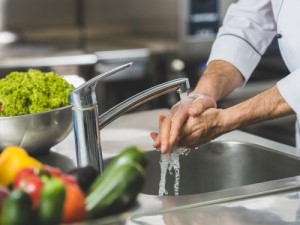
My husband gets frustrated with me because I’m always reminding him to wash his hands multiple times when cooking. He says washing before he cooks is enough. Which one of us is right?
In this case, you are right.
In fact, the U.S. Department of Agriculture just sent out a warning last week urging people to wash their hands throughout the food preparation process, not just at the beginning of cooking.
And when you wash your hands, the USDA is urging people to take their time and wash their hands properly.
This warning comes as a new USDA study in collaboration with North Carolina State University and RTI International, a North Carolina-based nonprofit research institute, found that people are failing to properly wash their hands 97 percent of the time when they are cooking, and instead are rushing through the process.
The study was conducted in six test kitchen facilities. It found that most people failed to wash their hands for the recommended 20 seconds, and most did not dry their hands with a clean towel. Many, instead, wiped their hands on their clothes or other objects.
Rushed handwashing can lead to cross-contamination of food and other surfaces, resulting in foodborne illness.
For example, the study found that 48 percent of participants spread bacteria from raw meat on their hands onto spice containers; 11 percent spread bacteria to refrigerator handles; and 5 percent of the time, bacteria was spread to salads.
One way to avoid cross-contamination is to always follow handwashing recommendations as advised by the Centers for Disease Control and Prevention:
- Wet your hands with clean, running water.
- Apply soap and lather to your hands by rubbing them together with the soap. Be sure to lather the backs of your hands, between your fingers and under your nails.
- Scrub your hands for at least 20 seconds — the amount of time it takes to hum the “Happy Birthday” song from beginning to end twice.
- Rinse your hands well under clean, running water.
- Dry your hands using a clean towel, or air dry them.
If soap and water are not available, you might alternatively use an alcohol-based hand sanitizer that is at least 60 percent alcohol, CDC says. However, it is important to note that while these sanitizers can reduce the number of pathogens on your hands in many situations, they don’t remove all types of pathogens.
Chow Line is a service of the College of Food, Agricultural, and Environmental Sciences and its outreach and research arms, OSU Extension and the Ohio Agricultural Research and Development Center. Send questions to Chow Line, c/o Tracy Turner, 364 W. Lane Ave., Suite B120, Columbus, OH 43201, or turner.490@osu.edu.
